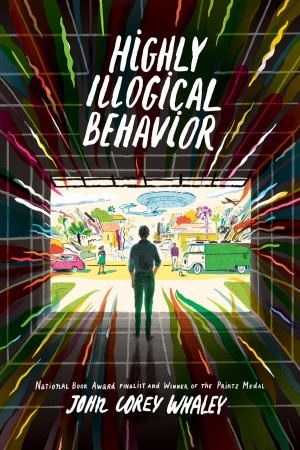2018 School Spending Survey Report
Interview: John Corey Whaley on Star Trek, Anxiety, and “Highly Illogical Behavior”
SLJ chats with Printz Award-winner John Corey Whaley about his third YA novel Highly Illogical Behavior

Photo by Vania Stoyanova
Printz winner John Corey Whaley made a splash on the YA scene with his debut Where Things Come Back, which garnered both the William C. Morris and the Printz Awards in 2012. In this new book, 16-year-old Solomon is agoraphobic and hasn’t left the house in three years and college-bound Lisa is determined to “cure” him in order to guarantee her place at a prestigious psychology program. Along with Clark, Lisa’s sweet and all-around-perfect boyfriend, the teens form a unique friendship in this quirky coming-of-age novel. In Highly Illogical Behavior (Dial; May 10, 2016), which received an SLJ star, Whaley explores the tenuous line between ambition and manipulation and the power of friendship and forgiveness. What is your writing process like? Process would be a strong word for how I work, but I guess I’d describe it as chaotic and unpredictable. Any time I try to plan out my writing too much, I end up getting creatively stalled in some way. Thankfully, my editor, the brilliant Namrata Tripathi, understands (and reassures me) that there’s a certain method to my madness, so we build in plenty of time to figure out just the right way to tell each story we decide to take on. Sometimes that means outlining a little bit and writing every day. Sometimes that means going weeks without writing a word, with no outline, and just letting my brain figure out the best way to approach a scene or overall plot. It can be a frustrating process—with the total lack of a concrete one—but it’s my belief that the best stories are hard-fought and shouldn’t fit into the same mold as any other—so it’s an ever-changing process with every book and somehow it works. What inspired you to write this particular narrative? I actually had a really tough time before and during my tour for Noggin—it seemed [that] an underlying anxiety disorder that I’d been able to keep at bay for many years had decided to rear its confusing and ugly head. And, well, I think writing about it was my first big step in figuring out my own anxiety and depression issues and tackling them head on. I’m happy to say [that] it helped in many ways. The depiction of this bright young man's struggle with agoraphobia is authentic, nuanced, and achingly real. How did you research the mental health aspect of his character? I used a lot of my own personal experience with anxiety to inform much of what Solomon goes through in the novel. But, it was also important to me that his struggle translated in some universal way to any of my readers who also deal with mental illness on a daily basis, so I definitely did plenty of research on agoraphobia and anxiety disorder. But much of Solomon’s situation is supposed to speak to the individualized and hard-to-understand nature of mental illness, so it was important to make his experience a very personal, unique one as well. Which character came to you first? Which one do you most identify with? And who is your favorite? Solomon was the first character in my head—and how I knew I wanted to tell the story of anxiety and agoraphobia—but I can identify with him and Lisa quite a bit. Lisa’s ambition drives her to be a little more bold than I ever was at that age, but much about her—from her eye-rolling at the boys for their dorky games and shows to the way she deals with her friend Janis, comes directly from me. I have an ever-going internal battle with my peaceful/calm/artistic side and my ambitious/too serious/sometimes cynical side, so it was great to explore those in a character like Lisa. My favorite character, though, is probably Clark. A) Because he’s least like me, and B) Because he was partly modeled after my boyfriend, to whom the book is dedicated. So that’s a given. Ha. Are you as big a fan of Star Trek as Clark and Solomon? What is your favorite iteration/episode? When I was in middle school, I was obsessed with Star Trek: The Next Generation. I had all the action figures and everything. So that’s what inspired Solomon and Clark’s love for the show. My favorite episode? That’s a hard one—I rewatched a ton of them when I was writing the book, but the episode that comes to mind at the moment is called “Yesterday’s Enterprise.” I’m a sucker for parallel universes and time travel…and Whoopi Goldberg. Often in YA, the parents are background characters, but in Highly Illogical, they are realistic and fully developed, and just as important to the plot as the teen protagonists. What motivated you to make them so integral to the plot? My editor and I talk about this quite a bit, and though I can’t promise to always portray parents in such a positive, present light, it’s been important to me, in three books now, to reaffirm to my readers, especially young ones, that there are good parents out there. There are parents who care and support and understand, or at least try to understand their kids. I want young readers to realize that—not just so the ones with parents like this can identify with my characters, but so readers with parents who aren’t living up to their duties can perhaps feel empowered to ask for more, for what they deserve—understanding, support, and a general respect that is lacking in many fictional and nonfictional parental/teenager relationships (hence the prototypical parents so popular in YA). Forgiveness is a big theme in the book. Did you find Lisa’s decision to befriend Solomon ultimately unforgivable? Do you think readers will come to forgive her? That part of me that wanted to explore the general misunderstanding of mental illness and the dangers of ambition, and friendship even, is the same part of me that needed to know if someone like Solomon—so trapped by his mental illness and own strong will—could forgive someone like Lisa, whose ambition and similar strong will have her trapped in a very different way. I hope readers will understand Lisa’s motives, especially through Solomon’s reaction in the end. Readers become totally invested in seeing this character succeed and embrace his life on the outside, yet to your credit, you don't opt for easy answers or a neat resolution. Did you always know how this story was going to end or did it morph several times? It definitely morphed many, many times and, for a very long time, just wasn’t there. I’m not a heavy outliner, because I usually can’t stick to them anyway, so a lot of my writing is blind and the end, though in sight, is sometimes as mysterious to me as it is to my readers in those last few chapters. Where do you see Lisa, Solomon, and Clark in five years? I know this may seem strange, but I have a way of disconnecting from my characters when I finish their story. Call it closure if you will—because writing them is very personal and it does often feel like missing a friend after I’m done—or call it my way of passing the baton on to my readers. Where do you see them in five years? That’s what I care much more about, really. My job is to tell one slice of the story of these characters’ lives—sometimes just a snapshot—and I’m quite happy for them to live on in the imaginations of my readers so I can move on to create more characters who, hopefully, will someday get to do the same. What are you working on next? It’s a secret. It’s always a secret. Isn’t it more fun that way?
Often in YA, the parents are background characters, but in Highly Illogical, they are realistic and fully developed, and just as important to the plot as the teen protagonists. What motivated you to make them so integral to the plot? My editor and I talk about this quite a bit, and though I can’t promise to always portray parents in such a positive, present light, it’s been important to me, in three books now, to reaffirm to my readers, especially young ones, that there are good parents out there. There are parents who care and support and understand, or at least try to understand their kids. I want young readers to realize that—not just so the ones with parents like this can identify with my characters, but so readers with parents who aren’t living up to their duties can perhaps feel empowered to ask for more, for what they deserve—understanding, support, and a general respect that is lacking in many fictional and nonfictional parental/teenager relationships (hence the prototypical parents so popular in YA). Forgiveness is a big theme in the book. Did you find Lisa’s decision to befriend Solomon ultimately unforgivable? Do you think readers will come to forgive her? That part of me that wanted to explore the general misunderstanding of mental illness and the dangers of ambition, and friendship even, is the same part of me that needed to know if someone like Solomon—so trapped by his mental illness and own strong will—could forgive someone like Lisa, whose ambition and similar strong will have her trapped in a very different way. I hope readers will understand Lisa’s motives, especially through Solomon’s reaction in the end. Readers become totally invested in seeing this character succeed and embrace his life on the outside, yet to your credit, you don't opt for easy answers or a neat resolution. Did you always know how this story was going to end or did it morph several times? It definitely morphed many, many times and, for a very long time, just wasn’t there. I’m not a heavy outliner, because I usually can’t stick to them anyway, so a lot of my writing is blind and the end, though in sight, is sometimes as mysterious to me as it is to my readers in those last few chapters. Where do you see Lisa, Solomon, and Clark in five years? I know this may seem strange, but I have a way of disconnecting from my characters when I finish their story. Call it closure if you will—because writing them is very personal and it does often feel like missing a friend after I’m done—or call it my way of passing the baton on to my readers. Where do you see them in five years? That’s what I care much more about, really. My job is to tell one slice of the story of these characters’ lives—sometimes just a snapshot—and I’m quite happy for them to live on in the imaginations of my readers so I can move on to create more characters who, hopefully, will someday get to do the same. What are you working on next? It’s a secret. It’s always a secret. Isn’t it more fun that way? See also: Flying High: The Improbable True Tale of Debut Novelist John Corey Whaley
RELATED
RECOMMENDED
CAREERS
The job outlook in 2030: Librarians will be in demand
CAREERS
The job outlook in 2030: Librarians will be in demand
ALREADY A SUBSCRIBER? LOG IN
We are currently offering this content for free. Sign up now to activate your personal profile, where you can save articles for future viewing






Add Comment :-
Be the first reader to comment.
Comment Policy:
Comment should not be empty !!!